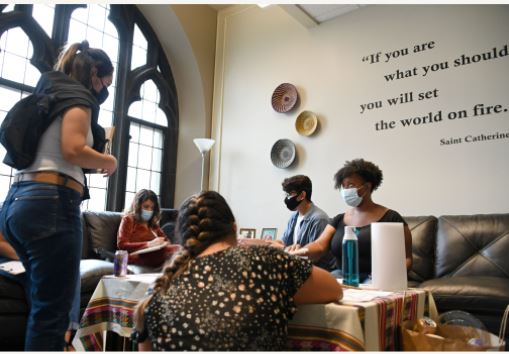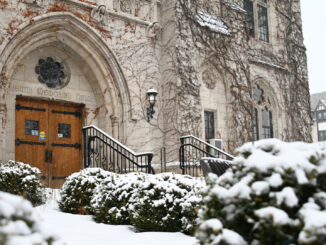
Elizabeth Nyugen
Contributing Writer
Students and graduates of Dominican’s School of Information Science (SOIS) commemorated Banned
Books Week this year with growing anxiety about the unprecedented rise in book challenges in
today’s heated political climate. Book challenges and banning have become a major topic of concern
and discussion according to the American Library Association (ALA), as incidences have risen drastically across the country.
According to the ALA’s 2022 State of America’s Libraries Report, there were 729 challenges to library material in 2021, counting both attempted and successful removal of material. This number is a dramatic increase to the 377 challenges reported in 2019. The ALA report attributes the rise to many factors, but
notable is the efforts of organizations such as Moms for Liberty and No Left Turn in Education.
These two groups have led the book banning crusade, using social media to quickly share lists of books for parents to report.
The books being challenged are most often about people of color or LGBTQ characters. Stories about the LGBTQ experience especially are among the most targeted by groups like Moms for Liberty. Information Science Student Association (ISSA), Dominican University’s official student chapter of the American Library Association, hosted a Banned Books discussion event in late September. Among topics of discussion were the tactics employed by groups like Moms for
Liberty.
“We noted that one strategy used is to take a particular passage out of context,” ISSA President Jonathan Standiford said. “The content is then deemed as ‘sexual.” Being deemed “sexually explicit” is the most cited reason for challenges this year, according to the same report. The ALA also reports that challenges have become increasingly hostile, documenting 27 police reports filed against librarians and that “threats against library workers grew more frequent. Proud Boys and armed activists protested at school and library board meetings.”
Standiford expressed concerns over how these aggressive tactics are impacting the way book challenges are handled. “It’s not so much the high-profile cases I’m alarmed the most about,” he said. “It’s the silent censorship; the libraries and schools that quietly take books off their shelves before they can be challenged because they’re afraid.”
Connie Meade, a 2021 graduate of Dominican University’s SOIS, is a children’s librarian at Franklin Park Public Library. While she did not attend the book discussion, she talked about her experiences with book challenges. She recalls one instance of a parent raising concerns about a picture book she had checked out for her son. “It was a book about the big bad wolf but told as an allegory for domestic violence in the house,” Meade said. “She didn’t realize until she read it with her son. I let my boss know about her concern in case it were to escalate to a formal ban.” The situation did not get to that stage.
Meade’s supervisor contacted the patron and explained that the book was part of a special children’s collection about sensitive topics; it was mistakenly put on display alongside the regular children’s books. This explanation satisfied the patron. “She didn’t know about the special collection before and actually decided to check out a few books from there,” Meade said. When it comes to individual parents expressing their concerns, Meade expresses optimism about the prospects for communication. “I feel like sometimes with parents being concerned about books is that it’s just a lack of information. They’re unaware about certain things and can be educated and realize that it’s good this book exists.”
Nevertheless, she admits that the situation is always delicate, no matter the scale, and must be handled with tact. “People attach emotions and feelings to their political beliefs, so a lot of people see it as ‘if you attack my political beliefs, then you’re attacking me personally.’” she said.
“There needs to be a really good mediator because [open dialogues] can get so out of hand because emotions escalate,” she says.
enguyen@my.dom.edu



